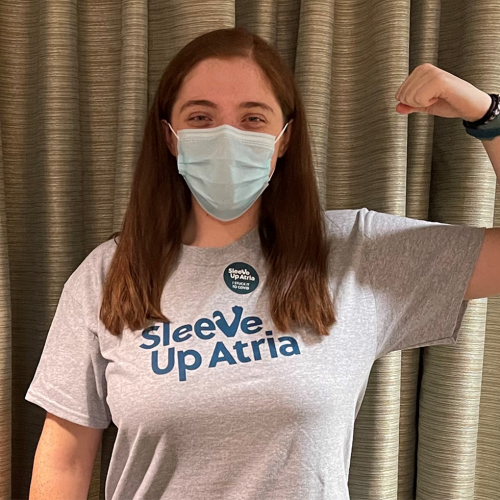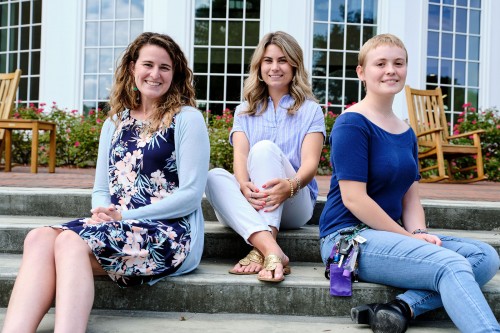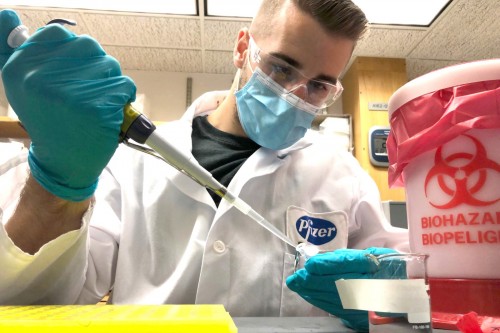Tech Support to Combat Social Isolation
Kristen Thornton ’22 guides older adults as they navigate the digital landscape.
Kristen Thornton ’22, a health science major and healthcare administration minor, spent much of the pandemic working as a certified nursing attendant at Atria Marina Place, a senior living facility located in Quincy, Massachusetts. Setting up technology for residents was a top priority for her and her coworkers as the world shut down in March 2020.
“That was one of the things we jumped on immediately,” Thornton said. “The facility’s managers knew we needed to do something to prevent everyone from feeling totally isolated.”
Social isolation and loneliness can have debilitating health implications for older adults. These conditions are also associated with higher risk of premature mortality, according to the Centers for Disease Control and Prevention.
Thornton’s team organized activities like conference call bingo to keep people engaged. They also rotated iPads between residents so they could take turns video chatting with their families. Though these pastimes may seem routine to some, participating sometimes proves challenging for older adults who did not grow up using smart phones or tablets.
“Managing these activities involved a lot of running around between residents, trying to show them how to use iPads and phones,” Thornton said. “Many of them did not know what to do because they lacked experience with these devices.”
Despite such challenges, studies by AARP and the Pew Research Center suggest older adults are becoming more technologically inclined and engaged. Smartphone ownership in adults aged 65 and older has steadily increased from 13 percent to 61 percent over the last decade. During the early days of the pandemic, this population turned to technology to combat social isolation and related loneliness; however, about half of older adults reported that they need help using their newly purchased devices.
Kristen Thornten teaches a Brockton resident how to use their smartphone.
Having witnessed firsthand the difficulties older adults face as they integrate technology into their daily routines, Thornton is doing her part to help them overcome these challenges. In partnership with the Brockton Council on Aging (COA), the Stonehill student recently organized three technology teaching sessions designed to serve people living in the City of Champions.
Overall, Thornton enjoyed facilitating the courses. She notes that several students approached her afterward to thank her for being patient with them as they learned to use their devices.
“A lot of them said that other people usually do things for them because it is easier than taking the time to show them how to do it themselves,” Thornton said. “All they want is to maintain their independence.”
Thornton taught these classes as part of a directed study with Dr. Danielle Waldron, assistant professor of healthcare administration.
“Better access to technology opens doors for communication, information and telehealth, so there are great implications for something like this initiative,” Waldron said.
Thornton also helped Brockton with their new age-friendly city designation by working with the COA to survey residents. They took on this project to pinpoint improvements that need to be made to the city’s community and health support programs, as well as the built and social environments inhabited by older adults in the area.
Kristen was on the frontlines of the pandemic. That, in and of itself, gives me reason to admire her. She put her own health at risk to help older adults.
Thorton’s work with the COA builds upon lessons that the Stonehill senior first learned in her Introduction to Gerontology course, taught by Waldron. The faculty member is part of Brockton’s Age-Friendly Task Force. Her scholarship has helped bridge gaps between research and policy related to care for older adults, as well as individuals with disabilities.
“Having Dr. Dani here is a big win for Stonehill,” Thornton said. “She’s done great work with the older population and has been an advocate for them. Her mentorship has really impacted me.”
Thornton will transition to a nursing program at Northeastern University after graduating from Stonehill. She is excited to apply what she has learned from Waldron to her future career, which will involve caring for older adults.
“Kristen was on the frontlines of the pandemic,” Waldron said. “That, in and of itself, gives me reason to admire her. She put her own health at risk to help older adults. After that experience, she wanted to expand her knowledge base by exploring how we can create age-friendly communities. She’s doing such great work.”
Related Articles
-

Two healthcare administration majors use Stonehill’s summer research program to address issues of accommodation and access in the nation’s health system.
-

In a poignant reflection of Stonehill’s mission, a number of students and alums are putting their degrees to work in the race for a COVID-19 vaccine.


